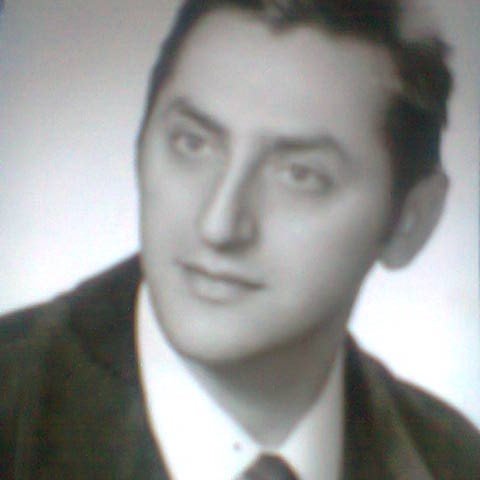Queer
Places:
Cmentarz Powązkowski
Warsaw, Miasto Warszawa, Mazowieckie, Poland
 Stanisław
Baliński (born on August 2, 1898
[1] in Warsaw , died on November 12, 1984 in London ) was a Polish
poet , prose writer , essayist and diplomat . In October 1918,
Jarosław
Iwaszkiewicz settled in Warsaw, where he helped found the cabaret/café
Under the Picadoro (Pod Picadorem) as a centre for writers dedicated to the
cause of Polish national independence from Russia. The group, which included
other homosexual writers such as
Jan Lechoń and Stanisław Baliński,
also created the journal Skamander as an outlet for nationalist writing.
Stanisław
Baliński (born on August 2, 1898
[1] in Warsaw , died on November 12, 1984 in London ) was a Polish
poet , prose writer , essayist and diplomat . In October 1918,
Jarosław
Iwaszkiewicz settled in Warsaw, where he helped found the cabaret/café
Under the Picadoro (Pod Picadorem) as a centre for writers dedicated to the
cause of Polish national independence from Russia. The group, which included
other homosexual writers such as
Jan Lechoń and Stanisław Baliński,
also created the journal Skamander as an outlet for nationalist writing.
Son of Ignacy Baliński (1862–1951) and Maria Chomętowski (1868–1934),
brother of Antoni Edward Baliński (1907–1990)
[2] , diplomacy worker
[1] . He graduated from the Polish studies at the University of
Warsaw and theory and composition of music at the Warsaw School of Music in
Warsaw , he also studied law. In 1920 he became a member of the Skamander
poetic group . From December 1, 1922, he began working at the Ministry of
Foreign Affairs . He spent five years at the facility in China , then in
Brazil and Persia. He made many trips to Europe, South America, the Far and
Middle East, and North Africa.
After the aggression of the Third Reich and the USSR against Poland (1939),
he left for Romania through Paris , and later to Great Britain . In 1939–1940
he was an employee of the Ministry of Information and Documentation of the
Polish Government-in-Exile . In the years 1940–1945 he was an employee of the
Polish Ministry of Foreign Affairs in London . After assuming the post of
foreign minister by Adam Tarnowski from November 30, 1944 to January 1945, he
was chargé d'affaires with the Czechoslovak government in exile . After
the war he remained in exile. In the 1950s he cooperated with Free Europe and
Voice of America. From 1945 he belonged to the English PEN Club .
In the interwar years he published, among others " Skamander " and "
Literary News " magazines. During World War II, he wrote in the magazines '
Polish News ' (1940–1944), ' New Poland ' (1942–1944), ' Dziennik Polski and
Dziennik Ż Soldier ' (1944). After the war, among others in " News ". He
signed a letter from Polish writers in exile, sympathizing with the
signatories of the protest against changes in the Constitution of the Polish
People's Republic (List 59)
[3] . His symbolic grave is located in Powązki, Warsaw (T-2-2)
[4] .
His song My Captain, already in the evening, was popularized by
Sława Przybylska , performing it to the music of Włodzimierz Korcz
[5] .
My published books:


BACK TO HOME PAGE

- Woods, Gregory. Homintern . Yale University Press. Edizione del
Kindle.
- https://pl.wikipedia.org/wiki/Stanis%C5%82aw_Bali%C5%84ski_(poeta)
 Stanisław
Baliński (born on August 2, 1898
[1] in Warsaw , died on November 12, 1984 in London ) was a Polish
poet , prose writer , essayist and diplomat . In October 1918,
Jarosław
Iwaszkiewicz settled in Warsaw, where he helped found the cabaret/café
Under the Picadoro (Pod Picadorem) as a centre for writers dedicated to the
cause of Polish national independence from Russia. The group, which included
other homosexual writers such as
Jan Lechoń and Stanisław Baliński,
also created the journal Skamander as an outlet for nationalist writing.
Stanisław
Baliński (born on August 2, 1898
[1] in Warsaw , died on November 12, 1984 in London ) was a Polish
poet , prose writer , essayist and diplomat . In October 1918,
Jarosław
Iwaszkiewicz settled in Warsaw, where he helped found the cabaret/café
Under the Picadoro (Pod Picadorem) as a centre for writers dedicated to the
cause of Polish national independence from Russia. The group, which included
other homosexual writers such as
Jan Lechoń and Stanisław Baliński,
also created the journal Skamander as an outlet for nationalist writing.
